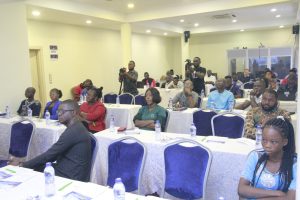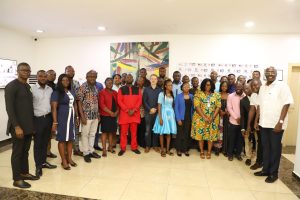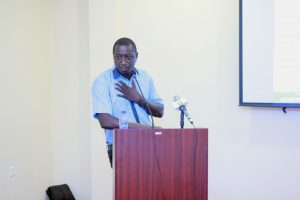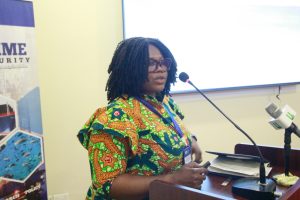The Centre for Maritime Law and Security (CEMLAWS) has observed that the proliferation of foreign-owned industrial fishing vessels on Ghana’s territorial waters, contrary to regulations is a threat to food security.
According to the CEMLAWS, although it was illegal for foreign-owned vessels to fish in Ghana, many fishing vessels flying the Ghana flags are foreign-owned with some Ghanaians acting as fronts.
This illegal practices on Ghana’s waters threatens food security and the livelihoods of thousands of artisanal fishers who depend on the sector,” Dr. Kamal-Deen Ali, Executive Director- CEMLAWS Africa warned at a media training.
These came to light during a training workshop for media practitioners on Distant Water Fishing (DWF) vessels in Accra organized by CEMLAWS and the Centre for Coastal Management (CCM) at the University of Cape Coast. The training was aimed at empowering the journalists to help expose these and other issues in Ghana’s fisheries sector.
The Fisheries Act 625 (2002) prohibits foreigners from operating industrial vessels or trawlers in Ghana.
Section 47 of Act 625 says an industrial or semi-industrial fishing vessel must be owned or controlled by a citizen of Ghana, the government, or owned or controlled by a company or partnership registered by law in Ghana.
But research has shown that this aspect of the law is being violated with many vessels illegally flying Ghana flags.

Dr. Kamal-Deen Ali, observed that, one of the key challenges confronting the fisheries sector was the lack of information to inform decision-making and enhance transparency, adding that the country must ensure its resources were protected in all arrangements and at all times.
“Vessels must fish in a way that is sustainable and takes into consideration the rights of others particularly those in the artisanal sector”
“We depend heavily on fish as a country so we cannot take the industry for granted; we must make sure that it is a resource that is protected,” Dr. Kamal-Deen Ali stressed.
The Director of the Centre for Coastal Management, Professor Dennis Worlanyo Aheto, agrees that the lack of information in Ghana was making things difficult to ascertain destabilizing impact of DWFVs on Ghana and other countries included in the project.
He admitted that, activities of the DWFVs were creating socio-economic impacts on fishing communities.
Prof. Aheto, expressed regret over lack of resources and financing to empower the local people.
According to him, there must be a deliberate effort to ensure that the laws work in the interest of the local people and the country.
According to the Ghana Fisheries Management Plan (2022-2026), currently, there are about 76 active industrial vessels in Ghana, which contributed to an estimated annual catch of over 37,000 metric tonnes in 2019.
It is estimated that one needs not less than US$10 million as minimum capital to register and operate trawlers in Ghana.
The Executive Director of the International Secretariat of the Fisheries Transparency Initiative (FiTI), Sven Biermann, said the transparency in fisheries management yields multiple benefits such as strengthening the ability for effective oversight, accountability, public dialogue and also enhances the capacity to manage fisheries sustainably based on best available information.
The training workshop forms part a project titled; “Promoting local capacity to address the destabilizing impacts of foreign fishing vessels in the Gulf of Guinea and Mauritania”.

According to Dr. Ali, the strategic objectives of the project was to increase CSOs monitoring, media reporting, and public awareness of destabilizing influences of Illegal, Unreported and Unregulated fishing (IUUF) and Distant Water Fishing (DWF) vessels in Ghana.
He said it is to achieve this objective that the implementation partners have developed a training package to equip journalists with adequate knowledge and skills for reporting competently on the fishing activities of foreign distant water vessels, and government’s fishing-related decisions and developments.
The project, which was being jointly coordinated by CEMLAWS Africa, and the Centre for Coastal Management (CCM), University of Cape Coast, is funded by the Department of State, U.S Embassy in Accra.

Some of the beneficiaries were delighted over the exposure and knowledge gained. They also look forward for more collaborative efforts to enable them produce more in-depth and facts driven stories on the fisheries industry and climate impact.

The journalists are also to educate the public on climate impact on the coastal environment to inform decision making.
Comments